Robinhood's Q2 earnings report provided a clear answer to the market: the decision for traditional brokers to embrace cryptocurrency is undoubtedly the right one.
Written by: Umbrella, Deep Tide TechFlow
On July 30, the highly anticipated Robinhood released its Q2 2025 earnings report, sparking widespread attention and discussion in the market.
Behind this earnings report is a key glimpse into how Robinhood is reshaping the role of brokers in the global embrace of the Web3 trend. As a platform transitioning from traditional finance to the forefront of Web3, its growth momentum and strategic layout are worth exploring.
Earnings Report Data Analysis
According to official reports (source: Robinhood Q2 2025 Earnings Report), Robinhood's total revenue for the second quarter was $989 million, a year-on-year increase of 45%, with net income reaching $386 million and a profit margin of 39%, significantly improved compared to the same period last year. These figures strongly reflect its robust progress in the market, showcasing its potential to gradually establish a foothold in the fiercely competitive brokerage business.
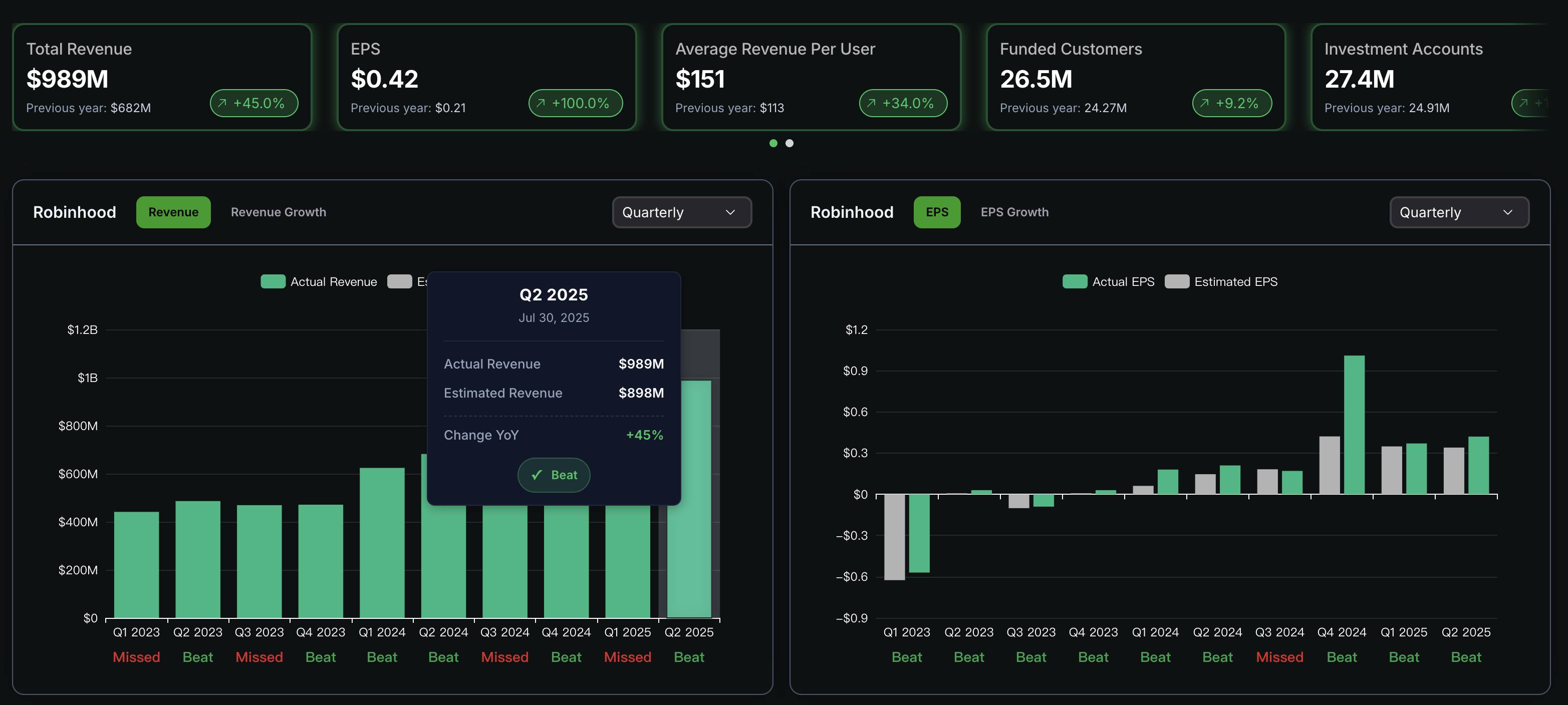
In terms of revenue composition, trading revenue (including options trading, stock trading, and cryptocurrency trading) amounted to $539 million, a year-on-year increase of 65%. This growth was primarily driven by the simultaneous increase in cryptocurrency and stock trading volumes. Its proactive Web3 transformation strategy, particularly the push in cryptocurrency business, serves as a significant new engine for trading revenue growth.
Interest income was $302 million, benefiting from the expansion of cash management products, while subscription services (mainly Robinhood Gold) contributed $114 million, a year-on-year increase of 76%, with the user base growing to 3.5 million. This demonstrates Robinhood's success in building a high-sticky revenue source.
Compared to Q2 2024 (total revenue of $682 million, net income of $188 million), Robinhood's trend towards revenue diversification has become increasingly evident, significantly reducing the risk associated with a single revenue source.
Behind these figures, Robinhood has demonstrated its ability to balance user growth and cost management. The significant increase in net income indicates that the company has seized market opportunities while controlling operating expenses, especially under changing interest rate environments and user behavior, with the growth in interest and subscription income providing strong support for the improvement in profit margins.
However, the diversification of revenue structure also brings new considerations: while the rapid growth of trading revenue is exciting, reliance on PFOF (Payment for Order Flow) may still face regulatory fluctuations; the expansion of subscription services requires continuous enhancement of user experience to maintain growth momentum. These numbers not only reflect current performance but also provide clear guidance for the company's future strategic adjustments, laying an important foundation for subsequent Web3 transformation.
Cryptocurrency Business Revenue Growth of 98%
In the past second quarter, Robinhood's most significant innovation was its attempts in the cryptocurrency field. According to the earnings report, Q2 cryptocurrency trading revenue was $160 million, a staggering 98% increase from $80.8 million in the same period last year.
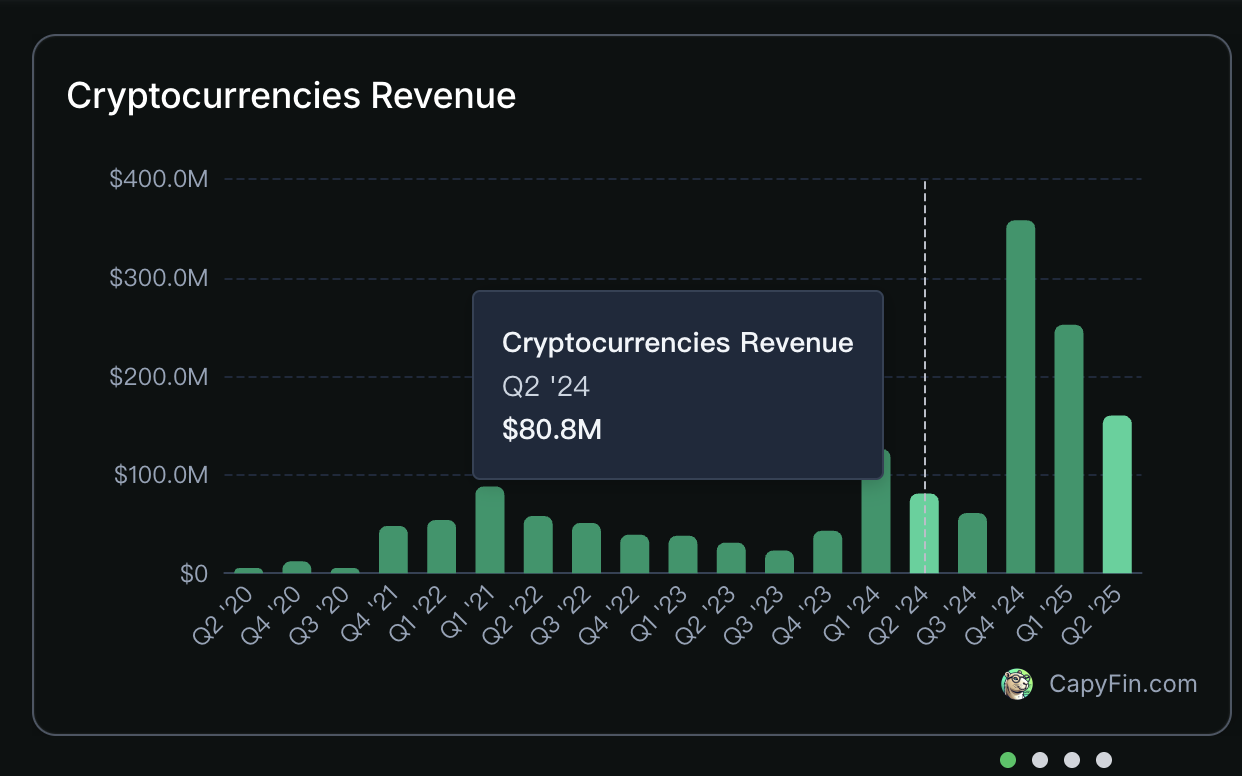
Such outstanding growth in the cryptocurrency sector is closely tied to two major moves Robinhood made this year related to the crypto field—acquiring Bitstamp and launching U.S. stock tokenization trading services.
On June 2, 2025, Robinhood announced the completion of its $200 million acquisition of the global cryptocurrency exchange Bitstamp. This exchange, one of the longest-operating globally, not only provided Robinhood with a mature cryptocurrency exchange network covering Europe, the UK, and Asia but also brought over 50 global regulatory licenses. More importantly, Bitstamp's institutional client base filled a gap for Robinhood, which has long been labeled as a "retail paradise," solidifying its position in both retail and institutional markets while also equipping it to compete with world-renowned cryptocurrency exchanges like Binance and Coinbase.
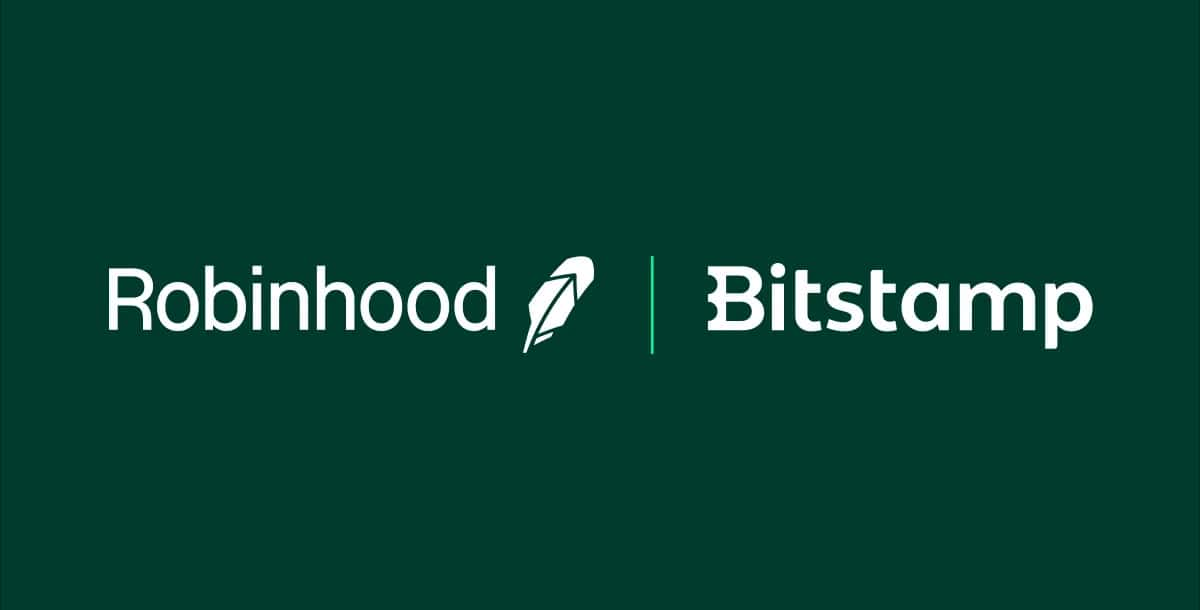
The acquisition of Bitstamp greatly bolstered Robinhood's expansion in the cryptocurrency sector, and stock prices are the most intuitive reflection of market sentiment: after announcing the completion of the Bitstamp acquisition, Robinhood's stock surged 13% to $74.42 in pre-market trading on June 4.
This acquisition, compared to data growth, may be more significant in its strategic implications. The acquisition of Bitstamp marks Robinhood's transformation from a retail-oriented trading platform to a global retail + institutional fintech enterprise, enhancing its competitiveness in the cryptocurrency sector.
In addition to the strategic acquisition of Bitstamp, Robinhood also made significant technological innovations—launching stock tokenization trading services aimed at the European market.
On June 30, 2025, Robinhood officially announced the launch of its U.S. stock tokenization products at the "Robinhood Presents: To Catch a Token" event held in Cannes, France, and went live in the EU on July 1.
Currently, Robinhood supports tokenized trading for over 200 popular U.S. stock symbols and ETFs, including well-known companies like Apple and Nvidia, as well as private popular companies like OpenAI and SpaceX. Although the founders of these two companies have publicly questioned this, there is no doubt that Robinhood has achieved its goal—attracting the attention of investors worldwide interested in U.S. stock trading.
Competitors
Robinhood's impressive performance in Q2 has also led to comparisons between Robinhood and traditional broker Futu in the market.
As a traditional broker, Futu is increasingly facing this "young competitor" that is growing stronger step by step. Some users on the X platform have shared their comparative analyses of the two brokers.
X user @bruce_aiweb3's tweet provided a detailed comparison of the two from various aspects. From the product background, Robinhood was created by Stanford high-frequency trading software developers rather than Wall Street, giving it a technology-first style from birth, with a smooth user experience and "gamified" guidance, making it highly praised among the young "retail" demographic.
In contrast, Futu benefits from its unique "Tencent" background, inheriting the precise vision and product control capabilities of a large company: killer products and a highly sticky communication community. While this background brings many mature experiences and methodologies, it also introduces geopolitical risks.
From the revenue model perspective, Robinhood currently relies mainly on PFOF (Payment for Order Flow) and interest income, which, while cyclical, generates very high revenue during the cycle. Futu's revenue sources are more diversified; in addition to commissions and interest, Futu also has B2B enterprise services (IPO distribution, IR, ESOP management) that bring high profits, enhancing Futu's resilience to market fluctuations.
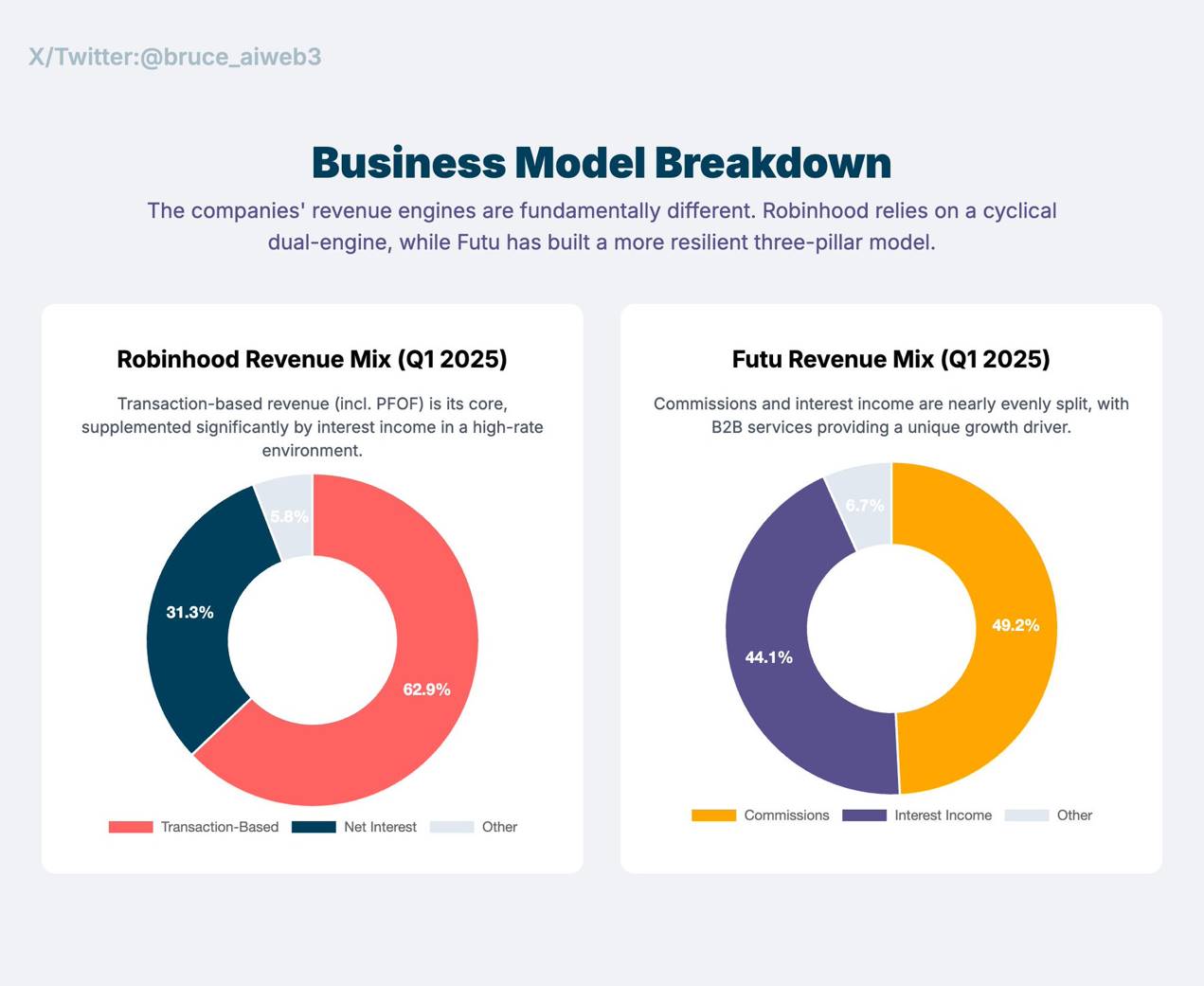
Image source: @Bruce_aiweb3
From a data comparison perspective, Robinhood's price-to-earnings ratio is approximately 63 times, far exceeding Futu's 10.5 times. Additionally, Robinhood has a larger user base, with 25.9 million accounts, about ten times that of Futu, although Futu's average user assets are higher.
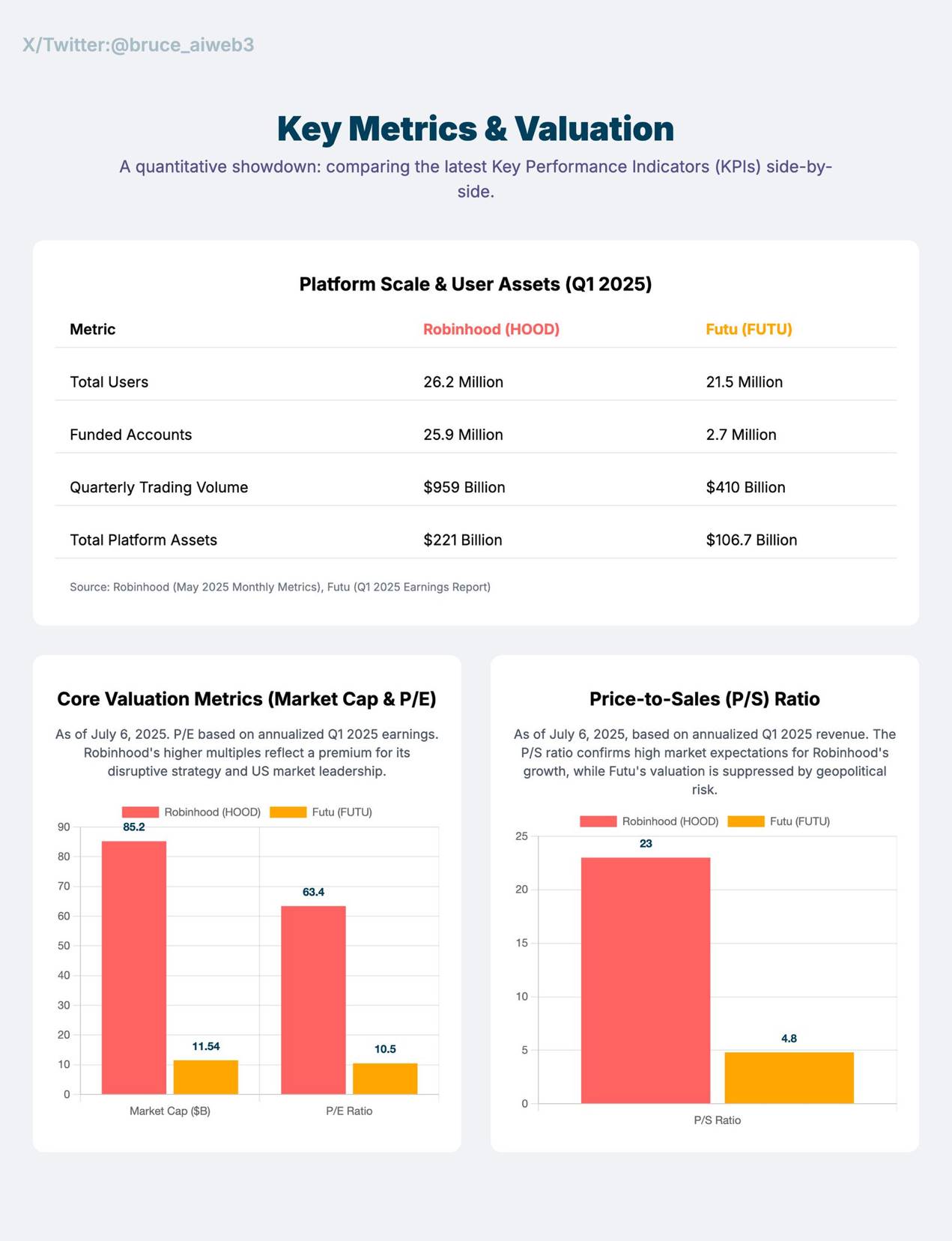
Image source: @Bruce_aiweb3
Since Futu has not yet released its Q2 earnings report, this article uses the Q1 earnings reports of both for comparison. Robinhood is larger in scale ($927 million vs. $603 million) but has a lower profit margin (36.2% vs. 45.6%). This reflects that while Robinhood is rapidly developing with a broader global coverage, it lacks the robust profitability that Futu has built over the long term.
This point is also reflected in the comparison of the 2024 fiscal year to the 2023 fiscal year: Robinhood's revenue grew by 58.6%, achieving a net profit of $1.41 billion, turning losses into profits. Futu, on the other hand, showed steady growth: revenue increased by 36.7%, and net income grew by 28.3%, reaching $699 million.
In future development, Robinhood is addressing the main threats of regulatory restrictions while embracing the global wave of Web3, gradually stepping towards becoming a global brokerage giant. However, the geopolitical risks that Futu has long faced remain and may not have good solutions in the short term.
As a "light of retail investors" and a rising star in the Web3 field, Robinhood has also been compared to the emerging decentralized exchange Hyperliquid in recent years.
In the data comparisons from May and June, Hyperliquid's trading data consistently exceeded that of Robinhood.
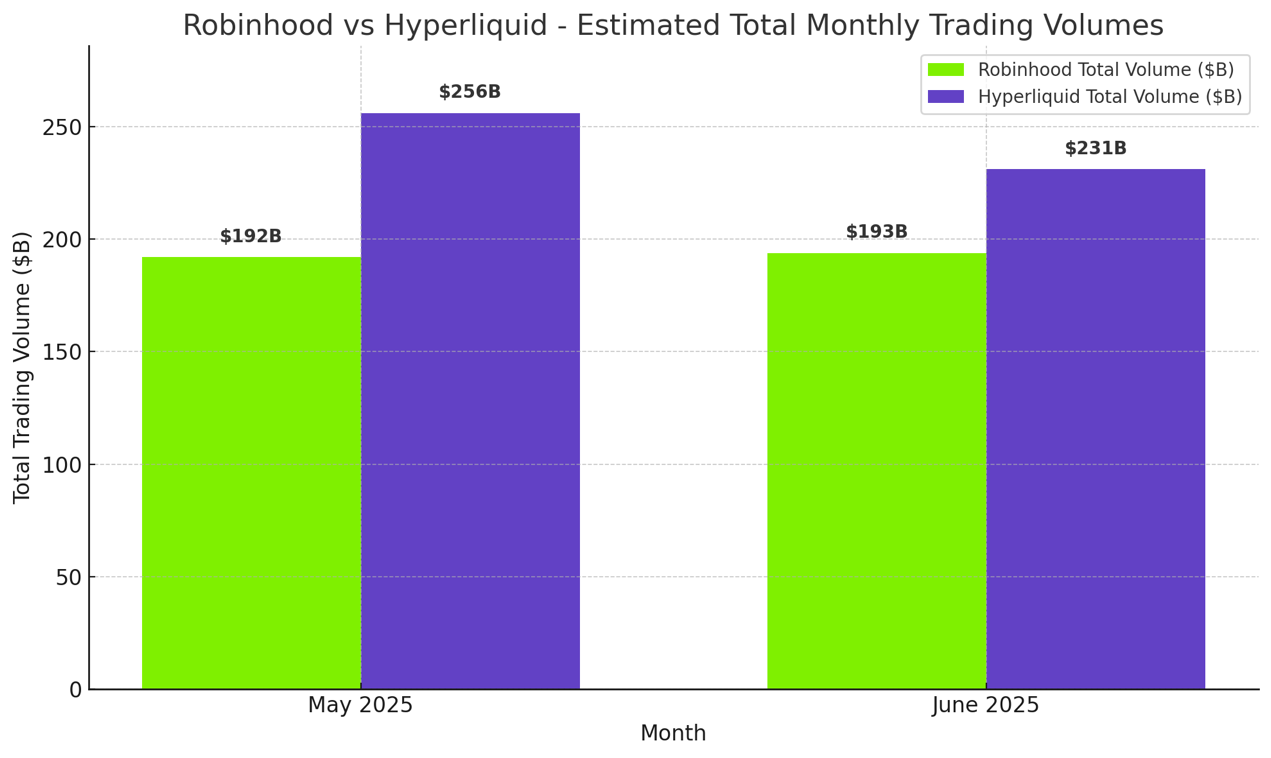
Image source: @jonbma
However, some users have pointed out that Hyperliquid's data comes from perpetual contracts, which significantly increases trading volume, making it an unfair comparison.

In addition, there are still a large number of users who believe that Hyperliquid is severely undervalued. This also reflects the enormous demand for cryptocurrency trading and indirectly validates Robinhood's correct choice to transform its Web3 strategy. Furthermore, Robinhood has a more diversified business model and a broader global market, which provides it with a much deeper moat compared to Hyperliquid.
Whether it is Futu or Hyperliquid, Robinhood has its own competitive advantages in comparison, currently situated in a multidimensional competitive landscape characterized by stable profitability, explosive growth, and technological innovation in the Web3 era. Robinhood has solidified its market position with its robust performance in Q2.
Starting the Second Half
Robinhood's Q2 earnings report provided a clear answer to the market: the decision for traditional brokers to embrace cryptocurrency is undoubtedly the right one.
Amid the growing global acceptance of Web3, Robinhood has undoubtedly become a leader in this wave. In the second half of this year, Robinhood will launch several cryptocurrency-related initiatives, such as acquiring the Canadian digital asset service provider WonderFi, launching cryptocurrency perpetual futures trading in Europe, and introducing more cryptocurrency product offerings for its customers.
We look forward to this "Robin Hood," which has emerged from retail investors, continuing to drive the integration of cryptocurrency and traditional finance in the second half of this year, delivering an even more outstanding performance.
免责声明:本文章仅代表作者个人观点,不代表本平台的立场和观点。本文章仅供信息分享,不构成对任何人的任何投资建议。用户与作者之间的任何争议,与本平台无关。如网页中刊载的文章或图片涉及侵权,请提供相关的权利证明和身份证明发送邮件到support@aicoin.com,本平台相关工作人员将会进行核查。




